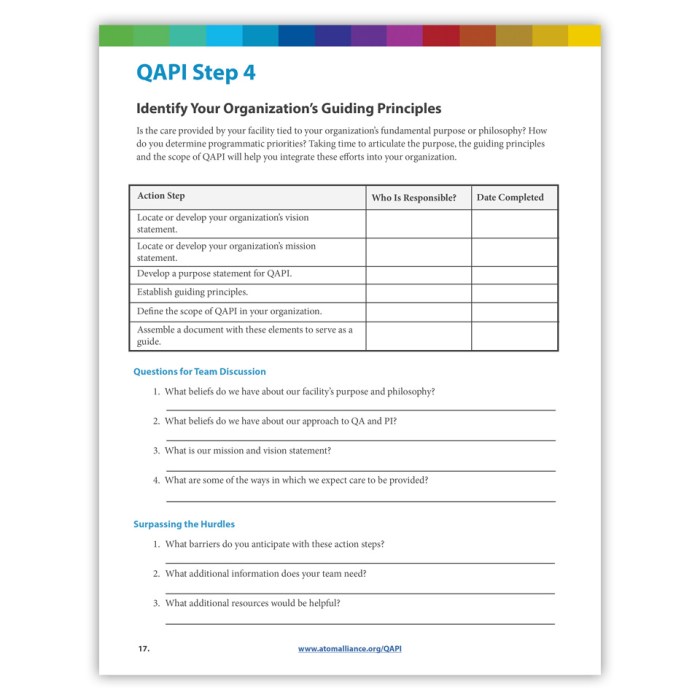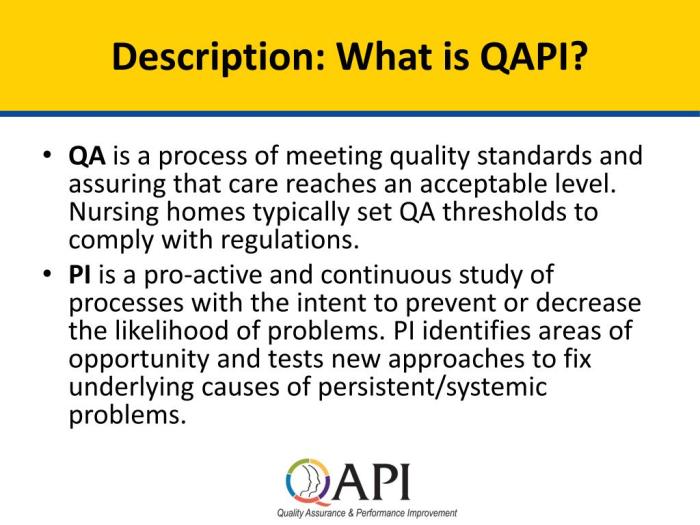Delving into the realm of healthcare quality, we explore which of the following is a principle of QAPI. Quality Assurance and Performance Improvement (QAPI) stands as a cornerstone in the pursuit of healthcare excellence, and its guiding principles shape its effectiveness.
QAPI encompasses a comprehensive set of principles that drive continuous improvement, patient safety, and quality outcomes. These principles serve as the foundation for QAPI programs, ensuring their alignment with the highest standards of healthcare delivery.
Overview of QAPI

Quality Assurance and Performance Improvement (QAPI) is a systematic and ongoing process designed to improve the quality of healthcare services. Its primary goal is to ensure that patients receive safe, effective, and efficient care, while also enhancing the overall performance of healthcare organizations.
QAPI is guided by a set of fundamental principles that provide the framework for its implementation and effectiveness.
Principles of QAPI: Which Of The Following Is A Principle Of Qapi

The principles of QAPI are essential for ensuring its success and impact. These principles include:
- Patient-centered care:QAPI prioritizes the needs and preferences of patients, ensuring that care is tailored to their individual requirements.
- Continuous improvement:QAPI is an ongoing process of identifying areas for improvement, implementing changes, and evaluating outcomes.
- Data-driven decision-making:QAPI relies on data to identify problems, develop solutions, and measure progress.
- Transparency and accountability:QAPI promotes open communication and accountability for quality improvement efforts.
- Collaboration and teamwork:QAPI fosters collaboration among healthcare professionals and departments to achieve common goals.
- Systems thinking:QAPI recognizes the interconnectedness of healthcare systems and seeks to improve the overall performance of the organization rather than focusing on isolated components.
Benefits of QAPI

Implementing QAPI in healthcare organizations offers numerous benefits, including:
- Improved patient outcomes:QAPI helps identify and address areas where care can be improved, leading to better patient experiences and health outcomes.
- Reduced costs:By optimizing processes and reducing errors, QAPI can help healthcare organizations save money.
- Enhanced efficiency:QAPI promotes streamlining of workflows and eliminates unnecessary steps, improving efficiency and productivity.
- Increased patient satisfaction:QAPI focuses on meeting the needs of patients, resulting in higher levels of patient satisfaction.
- Improved staff morale:By creating a culture of continuous improvement, QAPI empowers staff to contribute to quality improvement efforts, leading to increased job satisfaction.
Commonly Asked Questions
What is the primary goal of QAPI?
QAPI aims to continuously improve the quality and safety of healthcare services, leading to better patient outcomes.
How do QAPI principles contribute to healthcare quality?
QAPI principles provide a framework for healthcare organizations to assess, monitor, and improve their performance, ultimately enhancing patient care.
What are the key benefits of implementing QAPI programs?
QAPI programs have been shown to improve patient outcomes, reduce costs, and enhance efficiency in healthcare delivery.
